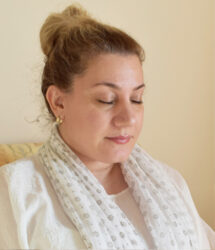Being Your Husband’s Caretaker

My friend and her husband were a happy, productive, generous and successful couple. Then, almost out of the blue, he was diagnosed with a serious illness and she took care of him through the rest of his life. A few days ago, about one year after her husband passed away, I talked with my friend to hear her perspective on caretaking. With clarity of mind and exceptional delicacy of feeling, she answered my questions.
Q: Did your orientation toward your husband change when you realized what was happening to his health?
A: When my husband was diagnosed with a terminal illness, I decided that there were two things that I really wanted to do—two promises I made, one to him and one to myself. The promise that I made to him was “You will never be alone. I will be there every single step of the way.” The promise that I made to myself was that however much time we’d have left together, I wanted him to feel completely and totally loved and that everything that I would do for him would ensure that he would leave this life feeling satisfied and fulfilled in his heart.
Q: Did becoming your husband’s caretaker, with its corresponding responsibilities, change your relationship emotionally?
A: I found that I discovered more areas within myself that were probably untapped because we had never had children. Even though we had many children in our life—between godchildren and nieces and nephews—we didn’t have our own children. So when my role changed from being not just a wife but also being a caretaker, I approached it with that same love, affection and support and a nourishing quality that I would have expressed for my own child—and yet he was my husband. I felt so much empathy and so much compassion for him that I just loved taking care of him. And not only did it connect us in a deeper way but it also was so satisfying for me.
Q: How did this affect him?
A: In terms of my husband’s feelings towards me or the way we interacted while I was in in the role of caretaker for him, well, he appreciated it. A couple of times he said, “You really like taking care of me, don’t you!” I think that the interesting thing in the dynamic of our relationship was the fact that I was such an independent woman so for him to be doted on by me and have all my attention on him—I think he really liked it. Actually I would say that he actually appreciated and enjoyed my caretaking up to the point when he knew that he had to depend upon me completely, and that was really just basically the last five weeks of his life. When the time came that he knew that he could no longer do basic things for himself, he did not want me to help him and, as a result, I decided to hire a male aide to help him. So that way we were able to maintain the sweetness and the tenderness of our husband and wife relationship rather than me going into the role of being his nurse. I think he didn’t want to change the dynamic between us in that way and so as soon as I had somebody else to help him with his really personal needs, we were able to completely resume the husband and wife relationship. Of course, I still took care of him in ways like making meals and organizing everything for him and the doctors and everything… but he was happy with that level of care. The issue was just with the personal needs that he did not want to feel dependent upon me—it was probably a little bit too difficult for him.
Q: How did you maintain your energy, focus, and well being during all that time?
A: Simply through Transcendental Meditation. I mean that there’s no question that, without TM, I wouldn’t ever have been able to survive not only the demands of someone who is very ill and the active medical treatment (which sometimes required going to the hospital twice a day) but also just the emotional aspect of knowing that your time with this person that you love and that you really feel is the love of your life is limited. It was TM that saved me—absolutely there was no way I could ever have been able to get through it in a balanced way otherwise. Also, TM provided the added value of cultivating the finest level of feeling and fostering my heart.
TM twice each day also kept my intellect very sharp—unbelievably, I was able to remember every drug, every treatment, every CAT scan—every treatment that Lee had and the dates associated with them to the point that when we would meet with his doctors, they’d ask me, “Oh, do you have a medical background?” I really don’t but it was just because TM gave me that clarity of thinking, mental alertness and sharpness that I was able to really evaluate and comprehend so much information and respond to it in a very timely way.
Q: Did the TM technique reduce the emotional stress of caretaking?
A: The fortunate thing was that he was so sweet and easy but sometimes it would just get overwhelming for me, just how difficult and challenging the situation was. I’d think I don’t know how I can get through this, how I can just get to the next step. But then, sure enough, I’d go to meditate and when I finished meditating then I was okay and ready to just pick up where I left off and just move on in a pleasant, upbeat, happy manner. Besides wanting my husband to feel that he was loved and well taken care of, I also wanted him to be in a happy, positive, uplifting environment to support his health and his emotional well-being.
Q: Did you feel at any time that taking time away from him to meditate was selfish?
A: No, I didn’t feel selfish. My husband was so used to my meditating that he actually liked having a break and he was happy not to have me not always hovering. He knew it was necessary and helpful for me to do it and so I never felt guilty in any way, shape or form. I would also make it a point to try to have some kind of regular exercise and to get outside once a day because I needed all of that to help me stay strong—I had to stay healthy in order to take care of him in the best way.
Q: When your husband passed, did the TM practice help sustain you during grieving?
A: When my husband passed, yes, meditating continued to be supportive because the nature of TM is to be supportive and nourishing on all levels of mind, heart, spirit and even physical endurance.
Q: Do you recommend that women learn the TM technique to sustain them through caregiving and grief?
A: Of course I do because TM enriches every aspect of the human physiology—every aspect of the nervous system and heart, mind, everything—and so no matter what you’re doing, whether you’re taking care of someone or being taken care of, and whether it’s a child or a spouse or a university—whatever it is, TM will support you and help you to be better at whatever it is you’re doing in your life.
Stress-Free Caretaking? Contact your local certified Transcendental Meditation teacher
About the Author
Janet Hoffman is the executive director of TM for Women Professionals, a division of TM for Women in the USA





